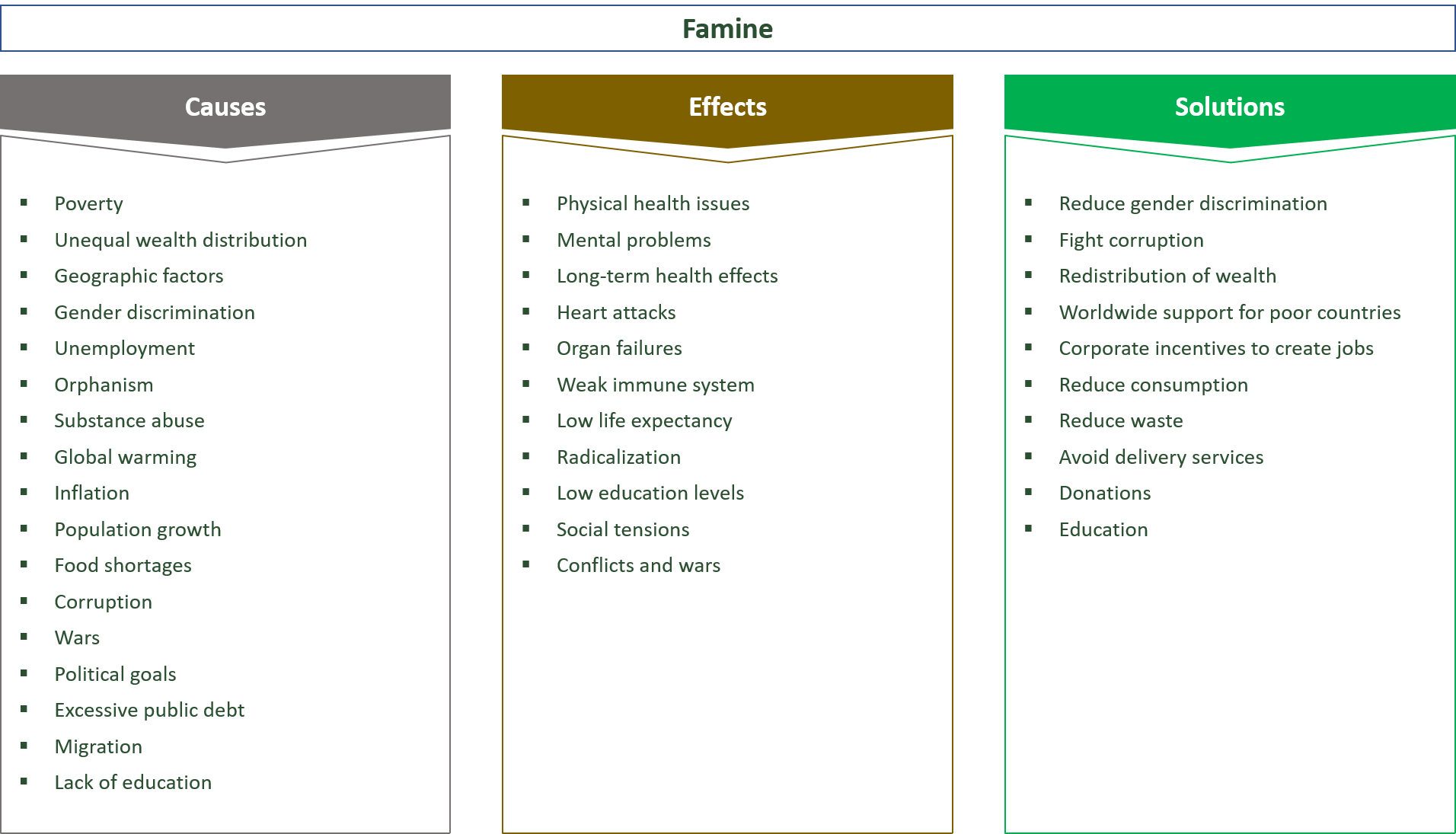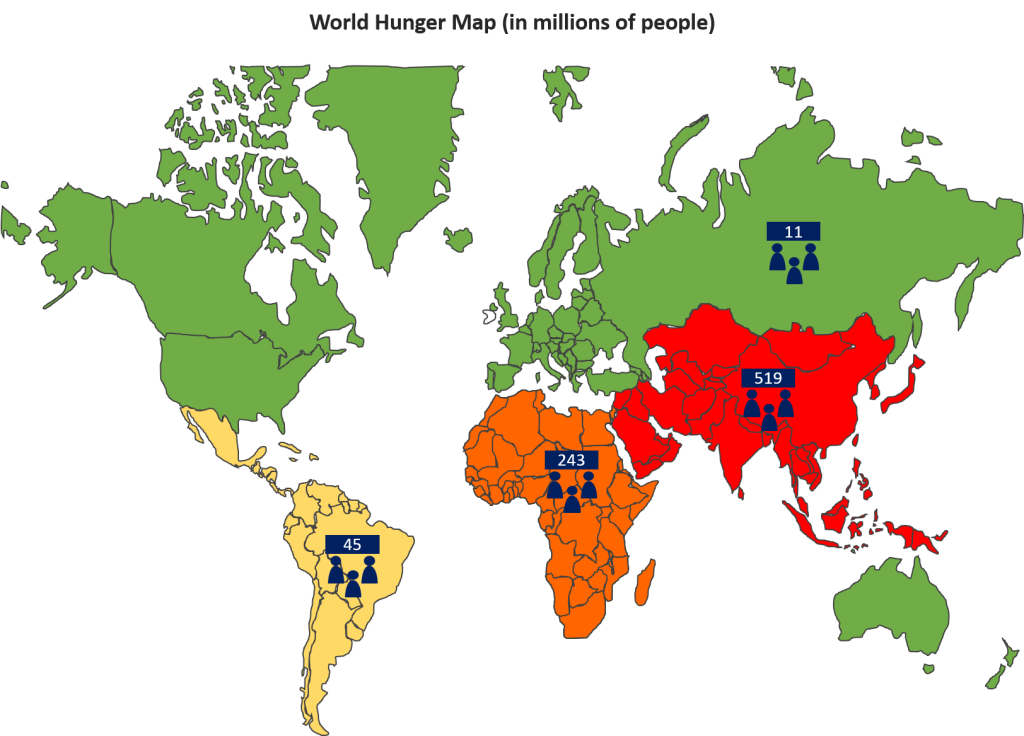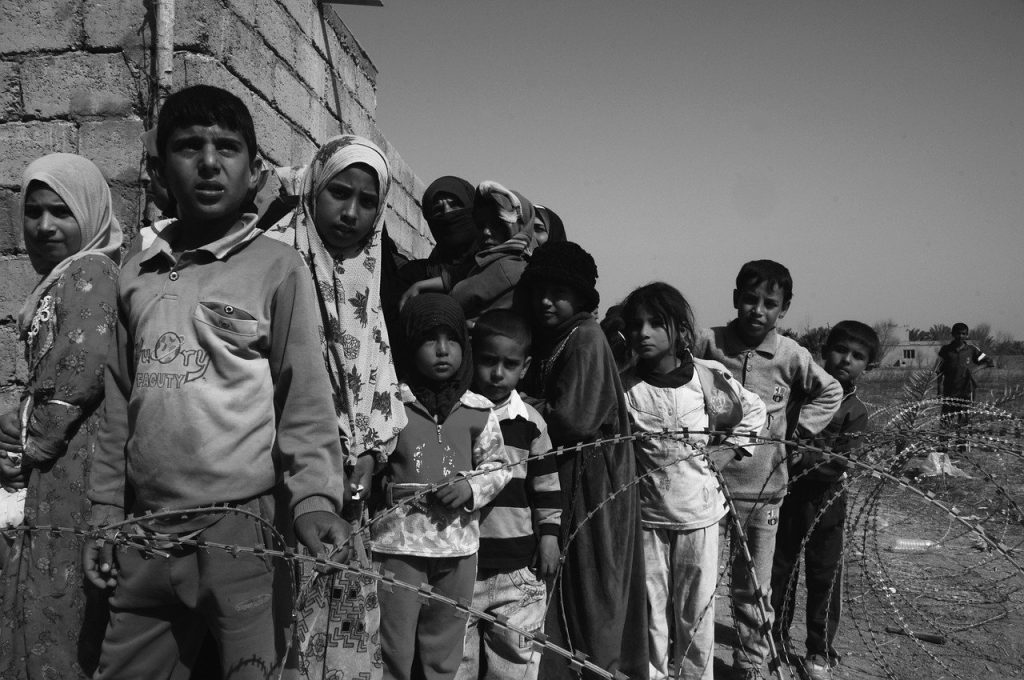“A person who steals bread during a famine is not treated as a thief.”
Cat Stevens, Musician
Famine: Causes, Effects & Solutions

Famine can be defined as a significant food scarcity that can last for a quite long time and may have severe consequences for the local population as well as for many animals and plants.
Especially in poor developing countries, famine is a big issue since the public infrastructure is often not quite good and there is often also quite an unequal distribution of goods, which can lead to severe hunger for the majority of the local population.
In this article, the extent, causes, effects and solutions for famine are examined.
Audio Lesson
Contents
Extent of Famine
According to the United Nations Food and Agriculture Organization, around 815 million people worldwide suffered from chronic undernourishment in 2016.
Most of the people suffering from famine live in middle or low-income countries in Africa or Asia.
Only 11 million people had been undernourished in developed countries.

Map of Famine worldwide: Data from FAO Report and WFP 2019
Causes for Famine
- Poverty
- Unequal wealth distribution
- Geographic factors
- Gender discrimination
- Unemployment
- Orphanism
- Drug use
- Global warming
- Inflation
- Population growth
- Food shortages
- Corruptive actions
- Conflicts
- Political goals
- Excessive public debt
- Migration
- Lack of education
Poverty
Poverty can be regarded as a main cause of famine.
In many poor developing countries, income and wealth levels are quite low.
Thus, people are often not able to earn enough money to afford appropriate housing and basic things for daily life, including sufficient food.
Therefore, especially in poor regions, people often suffer from famine simply due to a lack of money.
Unequal wealth distribution
Another reason for famine is that wealth is often quite unequally distributed.
In some countries, the top 1% owns almost all wealth while the majority of the local population suffers from serious levels of poverty.
Thus, while the top 1% can afford almost everything they want, the remaining 99% of the population will suffer from significant levels of famine since they will often not have the money to afford enough food and drinks.
Geographic factors
Some areas on our planet are also much more privileged than others regarding climatic conditions.
For instance, while there is plenty of water for agricultural purposes in Europe, there is often a water shortage in many countries in Africa due to the hot and dry climate.
Hence, in those regions, farmers will often suffer from low crop yields, which in turn may translate into significant levels of famine for the local population.
Making things worse, the global warming issue will further exacerbate the water shortage issue, since when the average air temperature increases, water will become an even scarcer resource and many farmers will lose their livelihood due to this.
Gender discrimination
Famine can also be caused by gender discrimination.
In many countries worldwide, women are still not regarded as equally valuable as men.
In those countries, women will often have a quite hard time since they will have it harder to find a good job and will also have disadvantages in several parts of their daily life.
In turn, women in those countries will also have a higher chance of suffering from famine since they are at greater risk to become unemployed or not to find a job that pays sufficient money in order to buy food or drinks.
Moreover, women may also be treated quite poorly by their husbands and may also suffer from famine due to that.
Unemployment
Another reason for famine may be unemployment.
Especially in countries with insufficient social security schemes, people are at great risk for poverty since if they become unemployed, they will not get any financial support from the government.
If these people do not have family or friends who could support them, chances are that they may suffer from significant levels of famine since without money, they are likely not able to afford food or other things for daily life.
Orphanism
Children who grow up without parents are at greater risk to suffer from famine compared to children who have parents that look after them.
Especially in poor countries, orphans will not have any support from grownups and may not be able to finish school. In turn, they may not find a suitable job, which may lead to significant levels of poverty and the resulting famine issue.
Drug use
The use of drugs may also indirectly lead to famine.
For instance, drug addicts often spend large fractions of their money for their substances since their drugs are often their priority number one.
Therefore, if they spend too much money on drugs, they may no longer be able to afford food or other things for daily life.
Global warming
Climate change may also contribute to the famine issue in several ways.
For example, if the global air temperature increases, regions that currently suffer from water shortages may suffer even more in the future.
Moreover, global warming will also increase the probability of natural disasters, which may destroy large areas of land.
In turn, the result will be vast destruction and also high levels of famine since most of the important infrastructure will be destroyed due to hurricanes, earthquakes or tsunamis.
Inflation
Inflation may also contribute to the famine issue.
In countries with high levels of inflation, the local population often loses trust in the local currency.
This may end up in a state where stores will no longer accept the local currency and may only accept foreign currency.
In turn, people who only have local currency will suffer from significant levels of famine, since they will no longer be able to buy basic food due to the inflation issue.
Population growth
Since our world population is growing, so does the demand for material goods, including food.
Many poor families often also have many children, since parents often regard their children as insurance for retirement when they will no longer be able to work themselves.
However, the higher the number of children, the more food parents have to supply and the higher the risk that some of the children will suffer from famine.
Moreover, since there is only a limited number of resources on our planet, population growth will exacerbate the hunger issue over time.
Food shortages
From time to time, especially in rural areas in poor developing countries, significant food shortages may occur.
This may be due to low crop yields caused by droughts or other natural events that have an adverse impact on the farmers’ yields.
In turn, since the local population often relies on those farmers, there will be a significant level of food shortage and famine since there will simply be not enough food to meet the demand of the local population.
Corruptive actions
In countries where corruptive activities are a big problem, famine may also be a significant issue since it often leads to a state where the minority of people own almost all of the wealth of a country while the majority of people remain poor and suffers from poverty and hunger.
Conflicts
Conflicts lead to all sorts of horrible events, including famine for a high number of people.
If regions are hit by large conflicts, chances are that important parts of their infrastructure may be damaged or even destroyed.
Moreover, many people will have to give up their homes, which may also lead to a loss of livelihood for them.
All this may significantly increase the likelihood of poverty and may also result in famine.
Political goals
Political goals may also play a big role in the development of famine. In some countries, there are still dictatorships.
These dictators often fear losing their power if the general public gets too much freedom and wealth.
Therefore, dictators often try to keep the local population poor, which may result in significant levels of famine for a high number of people.
Excessive public debt
High public debt may also contribute to the famine issue.
Countries that suffer from high levels of public debt may often not be able to provide sufficient social security to locals since these countries simply do not have enough financial measures.
Thus, people in those countries may suffer from significant famine since in case they become unemployed, they will not get support from the government and may not be able to buy food due to that.
Migration
Many people give up their homes due to wars or other issues and try to migrate to other countries in order to find a better future.
However, they often end up in quite bad conditions since they often have no language skills and also often only have low levels of education which makes it hard for them to find a job.
Consequently, those migrants will suffer from serious levels of famine if they are not able to integrate into different cultures.
Lack of education
Education is key to overcome poverty and therefore to decrease the risk for famine.
If people have a high level of education, they have better job opportunities and also have the chance to move to rich developing countries where they can have a higher quality of life.
In contrast, people who lack proper education may often be trapped in poverty since they will not have the opportunity to find a good job abroad, which may turn into significant levels of famine, especially in countries with low or no social security at all.

Effects of Famine
- Physical health issues
- Mental problems
- Long-term health effects
- Heart attacks
- Organ failures
- Weak immune system
- Low life expectancy
- Radical tendencies
- Low education levels
- Social tensions
- Conflicts
Physical health issues
Famine can lead to serious physical health issues.
Our body needs certain minerals, vitamins and also calories to work properly so that we have the power to work physically and also to be able to manage several tasks of our daily life.
However, if this supply with nutrients is reduced due to famine, our body may no longer work properly and we may suffer from cramps or other health issues that might prevent us to carry out physically demanding work.
Mental problems
There are also plenty of mental health issues connected to famine.
Our brain can only function in a proper manner if our body gets enough nutrients.
Thus, a lack of minerals and vitamins may lead to decreased mental power.
Moreover, the chances for mental issues like dementia may also increase due to a shortage of important substances.
Long-term health effects
Famine can also cause long-term health effects.
Some organs may simply not be able to recover after an extended period of famine.
This is especially true for children since their body and brain urgently need sufficient nutrients to develop in a healthy manner.
Therefore, if children do not get enough nutrients, they may suffer from severe mental as well as physical health issues in the long run.
Heart attacks
If famine is quite severe, it may also lead to many cases of heart attacks for the local population.
Our body is a complex system and only works properly as a whole if it gets enough vitamins, minerals and energy.
If the body is not able to get these components, chances are that also the heart may suffer since it will lose its power, which may cause heart attacks or other heart issues.
Organ failures
A lack of nutrients may also lead to organ failures.
At a certain point, our organs may simply no longer work properly due to a lack of vitamins and minerals.
Over time, our organs may be damaged to such an extent that organ failures may be the end result of famine.
Weak immune system
Our immune system has to fight several bacteria over the course of our life.
For a healthy body, this is not a big task since our immune system usually is quite strong.
However, if we lack proper nutrition, chances are that our immune system may suffer and we will become more vulnerable to diseases.
This is especially true for people living in countries with significant levels of hunger and famine.
In those countries, people may not be able to get enough food to meet their nutrient demand, which may lead to a weak immune system and a higher risk for getting infected with diseases.
Low life expectancy
The overall life expectancy of people living in regions where famine is a big issue is often quite low.
The higher probability for diseases in combination with the higher chances for organ failures and heart attacks lowers the life expectancy of locals dramatically.
Moreover, their will to live may also be quite low due to their adverse living conditions, which may also contribute to a lower life expectancy.
Radical tendencies
People suffering from famine may also be more likely to join radical movements since they are frustrated or urgently need food to survive.
If those radical movements promise these people enough food and a higher level of wealth, chances are that some people may fall for it out of pure desperation.
Low education levels
Famine may also lead to quite low levels of education for the local population.
Since food is important for our brain to function properly, a lack of nutrients may prevent people to learn in an efficient manner.
Moreover, famine may also decrease the motivation to learn for many children since they just do not have sufficient energy to do so, which may also result in low levels of education and the resulting long-term consequences.
Social tensions
People who suffer from famine may also be quite frustrated.
This frustration may turn into social tensions.
This is especially true in poor neighborhoods.
If your neighbor has a high income while you are struggling to earn enough money to be able to buy food and basic things for your daily life, you may become quite envious.
This may turn into significant social tensions if the distribution of wealth is quite unequal, especially in poor developing countries.
Conflicts
Famine may also increase the probability of conflicts.
In some poor areas around the world, people who are struggling to get enough food to survive may literally fight over these basic resources since they have to in order to survive.

Solutions for Famine
- Reduce gender discrimination
- Mitigate corruptive activities
- Redistribution of wealth
- Worldwide support for poor countries
- Corporate incentives to create jobs
- Reduce consumption
- Reduce waste
- Avoid delivery services
- Donations
- Education
Reduce gender discrimination
One measure to fight famine is to reduce gender inequality.
Governments around the world have to make sure that women are treated as equally important as men so that they get similar job opportunities and all other chances in their life.
This will also mitigate the famine issue since those women will be able to get better education and therefore better jobs and may be able to escape poverty.
Mitigate corruptive activities
In countries where corruptive activities are a big problem, governments have to make sure that the level of corruptive actions is decreased so that poor people have a better chance to improve their situation and to get out of poverty and famine.
Redistribution of wealth
In countries where wealth is quite unequally distributed and a small minority of people own almost everything in the country, measures have to be taken in order to redistribute this wealth.
This could come in the form of higher wealth taxes or measures.
By doing so, the money that can be collected from quite wealthy people could be redistributed to poor people, which may reduce the extent of famine to a significant extent.
Worldwide support for poor countries
Countries all around the world have to cooperate in order to eradicate famine from our planet.
In fact, eradicating extreme poverty and hunger is one of the eight Millennium Development Goals of the United Nations.
Moreover, there are many other initiatives and organizations which aim to reduce famine worldwide, including the World Food Programme.
Therefore, there already is quite a lot of support for poor countries.
However, the support can also be further increased in order to reach the goal to eradicate famine even sooner than planned.
Corporate incentives to create jobs
Corporations can contribute their part by creating jobs and opening branches in poor regions around the world.
By doing so, people in those regions may find better job opportunities and may therefore be able to get out of poverty, which in turn may also reduce the famine issue.
Reduce consumption
Since our consumption behavior is a significant cause for global warming and global warming contributes to famine through droughts and natural disasters, it is crucial that we reduce our consumption in order to mitigate climate change and in turn to reduce the famine problem.
Reduce waste
Part of our global waste has to be burned, which leads to the emission of harmful greenhouse gases and in turn contributes to global warming.
Thus, by avoiding waste, everyone of us can contribute his or her part to slow down global warming and therefore to mitigate global famine.
Avoid delivery services
Since delivery services of all sorts often contribute to greenhouse gas emissions and excessive waste production, you can further improve your ecological footprint by refraining from ordering online and by buying in local stores instead.
By doing so, you can reduce greenhouse gas emissions and in turn also mitigate famine.
Donations
Donations to organizations that aim to end famine can further reduce the global hunger issue.
If you want to donate, please make sure that you donate to official or other reputable organizations so you can be sure your money will be spent in an efficient manner.
Education
Education is key to fight famine all over the globe.
Only if people are aware of the problem and know how to mitigate it, effective measures will be taken in order to reduce the famine issue.
This education should start early in school since school kids are often more willing to learn new things and to adjust their behavior.
Moreover, these children may also convince their parents, which makes it more likely that also their parents may act more environmentally-friendly.
Conclusion
Famine is a significant global problem, especially in poor developing countries that are often exposed to adverse climatic conditions and are frequently hit by natural disasters.
It is crucial that we take measures against the famine issue on a global scale. Everyone of us can contribute to mitigate the issue by adjusting our consumption behavior.
Moreover, governments around the world have to work together and support poor countries so that famine can be overcome.
By doing so, we can assure a better future for millions or even billions of people worldwide.
Sources
https://en.wikipedia.org/wiki/Famine
http://www.fao.org/3/I9553EN/i9553en.pdf
https://edition.cnn.com/2013/08/20/world/famine-fast-facts/index.html
https://www.worldhunger.org/world-hunger-and-poverty-facts-and-statistics/

About the author
My name is Andreas and my mission is to educate people of all ages about our environmental problems and how everyone can make a contribution to mitigate these issues.
As I went to university and got my Master’s degree in Economics, I did plenty of research in the field of Development Economics.
After finishing university, I traveled around the world. From this time on, I wanted to make a contribution to ensure a livable future for the next generations in every part of our beautiful planet.
Wanna make a contribution to save our environment? Share it!